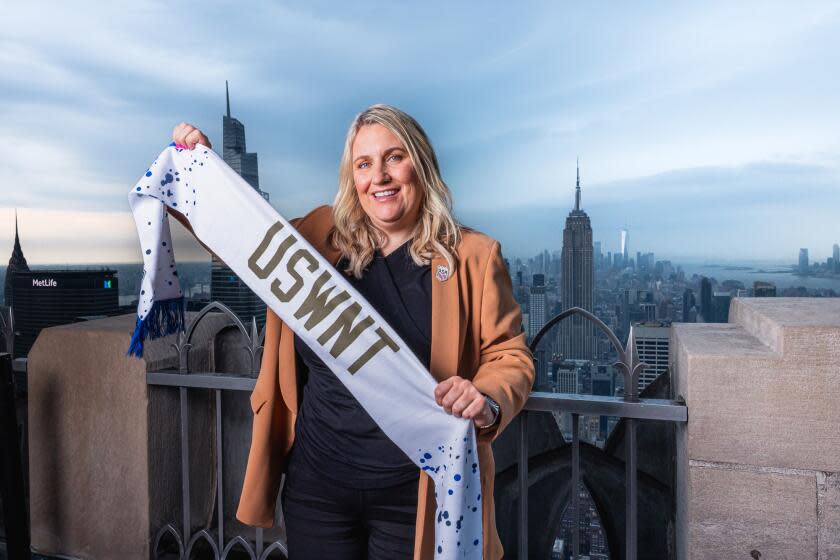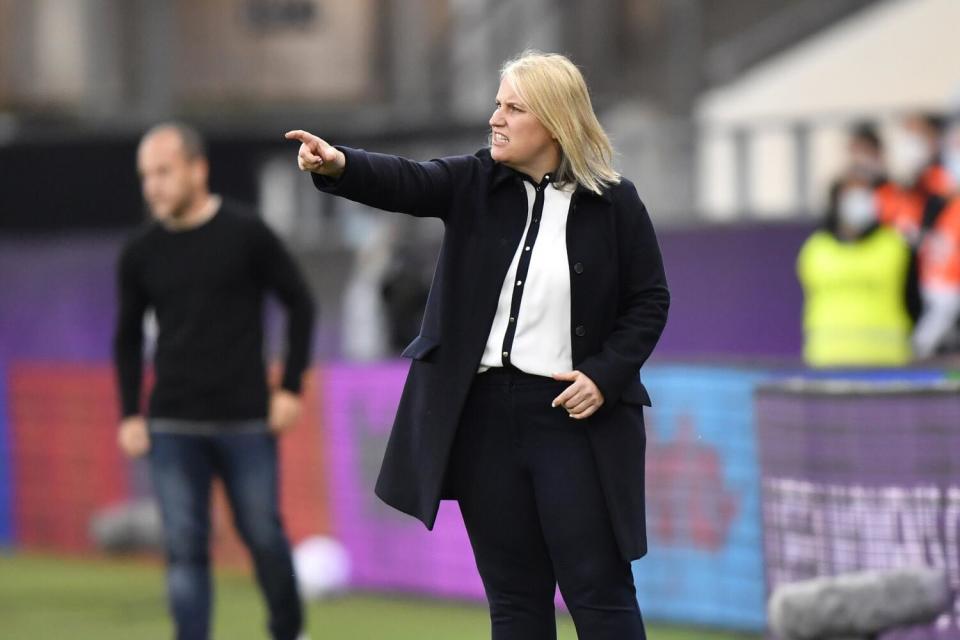Emma Hayes aims to replicate her Chelsea success with U.S. women's soccer

The women’s national soccer team hasn’t won an Olympic championship in 12 years, its longest drought ever. Yet for Emma Hayes, the woman tasked to get the U.S. back to the top of the medal podium, memories of the 2012 tournament have little to do with gold medals.
The Games were played in England that year and Hayes’ father, Sid, became enamored with the Americans. So much so that when Hayes took the head coaching job with the Chelsea women’s team that same summer, he urged her to remake the English game in the U.S. model.
She did, hoisting 16 trophies. So with little left to win in England, Hayes became a candidate for the U.S. coaching job when it came open last year — and that led to another conversation with her father just before he died in September.
This time he urged her to remake the American team in the Chelsea model.
Read more: Angel City and San Diego Wave are rivals on the pitch and strong collaborators off it
“I have a 23-minute voice note, my last conversation with my father, and it was all about 2012,” Hayes said Thursday, midway through her first official day as coach of the national team. “At the end of it he goes, ‘You’re going to take it, won’t you?’
“I almost talked to him like I had the job, even though I didn't, because I wanted him to go with that thought. By the time October rolled around and I interviewed for the job, I just thought I could hear him in my head the whole time. ‘You've got to do it.’ ”
She did, although she had to wait for her contract at Chelsea to run out, which it did last weekend with Hayes winning her fifth straight Women’s Super League title. Now she has less than 10 weeks to prepare the U.S. for another Summer Games, this one in France, where it will face the best field in Olympic history.
Her work will begin in earnest next week when Hayes gathers her first U.S. team in suburban Denver for training camp and the first of two friendlies with South Korea. After that, the she’ll have to choose her 18-player team for Paris.
And after her success in England, she says the challenges of her new job have re-energized her.
“Working at Chelsea took my whole life for the past 12 years and I really wanted a change,” said Hayes, 47, who will reportedly earn close to $2 million a year with the USWNT, making her the best-paid women’s soccer coach in history. “Just driving into the same workplace six days a week, the game every three days, the intensity of all of those things. I couldn't do that again. Not at this moment in time.

“There's a different ebb and flow to international football. You don't get many opportunities to go to an Olympics in your life."
Hayes, who was born in London, arrived in New York to start her new job Wednesday and immediately took a walk around Central Park. She’s no stranger to the city or the park, having taken her first coaching job with the Long Island Lady Riders of the USL-W League. The team went 11-3-0 and Hayes, just 25, was named the league’s coach of the year.
She would quickly move on to Iona University and the Chicago Red Stars, which then played in the WPL, before returning to England with Chelsea in 2012. But, she said, she always planned on coming back to the U.S.
“My journey has been bottom up. So I have such an appreciation, not just of the landscape, but of my journey,” she said. “We all have dreams. But it's not often your dreams become a reality. And I always grew up with that notion, this whole American dream concept, that you can come to the country — and as a woman coming from England, trust me, I never felt more supported than I did when I worked in the U.S. — and work my way up through the system to be now be the head coach of your national team.
“I will give absolutely everything I've got to make sure I uphold the traditions of of this team.”
Read more: How an L.A. humanitarian group is using soccer to help children stuck at Mexico border
Although next week’s training camp will be her first in charge, she said the transition from Chelsea to the national team began months ago with late nights watching NWSL games from England and in regular conversations with Twila Kilgore, the U.S. team’s interim coach.
“I feel like I've been able quietly get to know the job without being in the job. And I think that's really helped,” she said. “I've been preparing. All the camp preparation is done, all the sessions are planned, the June schedule is planned out in terms of our meetings. So everybody is clear on what's going on.”
Hayes said she also plans on meeting privately with every player, giving them a chance to get to know their new coach just as the new coach will get to know each player.
“I want to build trust,” she said. “I want to come from a place where trust is the foundation. I want to build a family in their environment that everybody looks after each other within that. And I recognize the program's history.
“I have admired so many things that the players have done over the years to advocate, not just for themselves, but for the things and causes that matter most. I don't want to change those things, but I also want to make sure everybody understands that everything we do, we have to ask ourselves ‘is this helping the team win?’ That's what my focus will be.”
Read more: Many familiar names on roster as U.S. women's soccer team readies for Olympics
A focus on getting the team back to the kind of play that made her father a fan, which won’t be easy, Hayes concedes. Not only has the U.S. gone 12 years without an Olympic title, but it bowed out of last summer’s World Cup in the round of 16, its earliest exit ever in a major world championship
“What we saw last summer is how that gap has been closed,” Hayes said. “Sometimes you need something like that as a reminder that what got you here won't get you there. It’s an opportunity now to to evolve. In world football, especially in Europe, there's a lot of investment. Teams are at a certain level now that they weren't four years ago.
“I'm never going to tell anyone to not dream about winning. So go for it,” she added. “But we have to go step by step. If we can perform at our best level, then we have a chance of doing things. But we’ve got work to do.”
This story originally appeared in Los Angeles Times.

